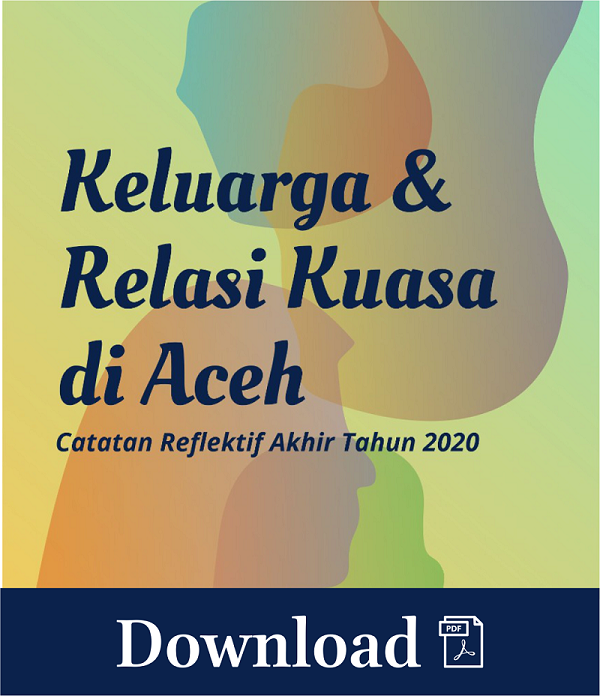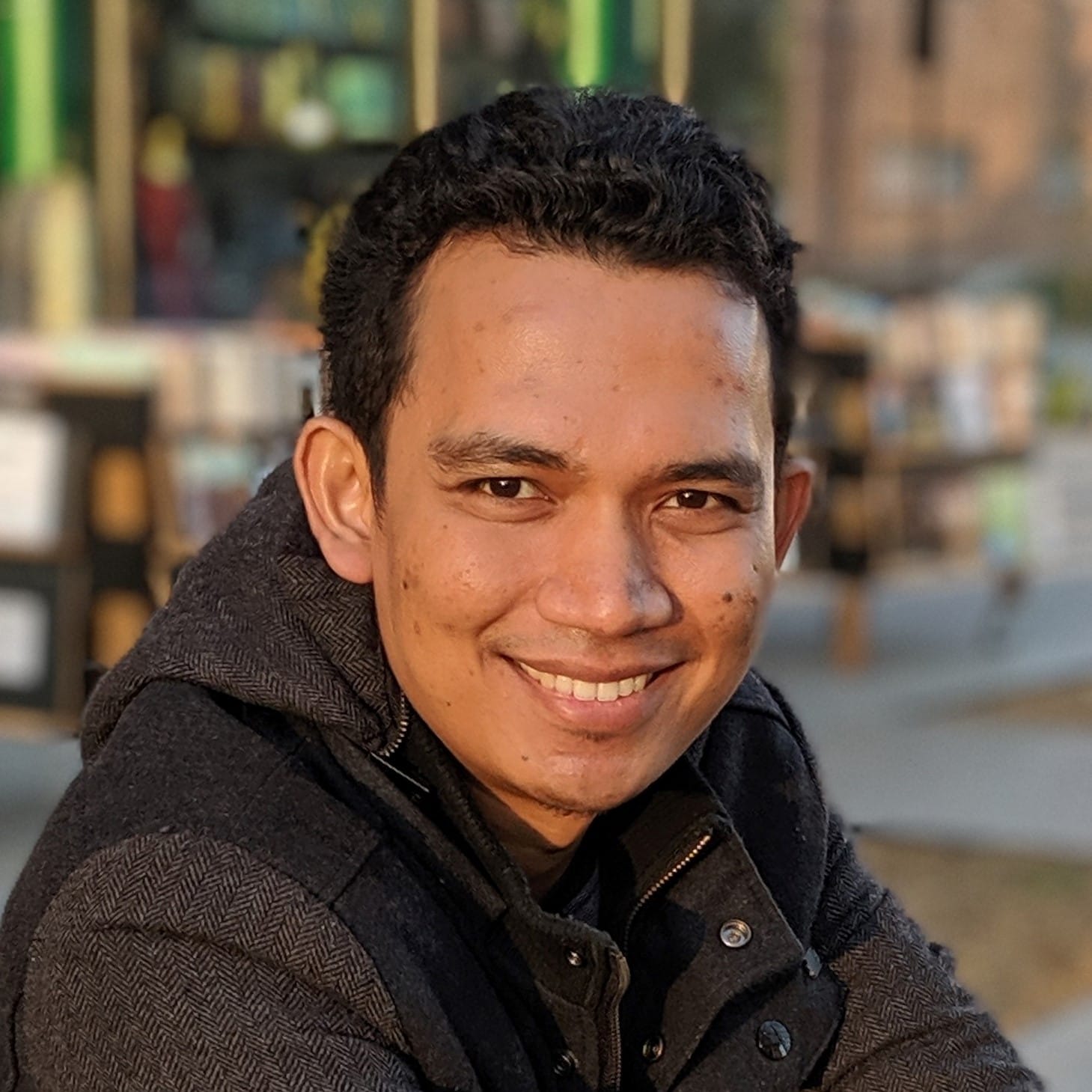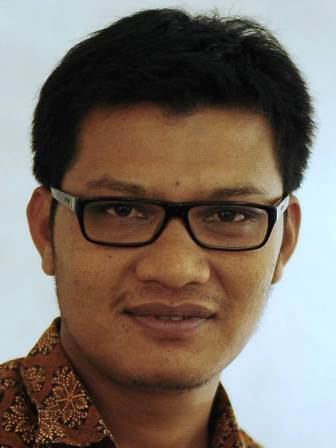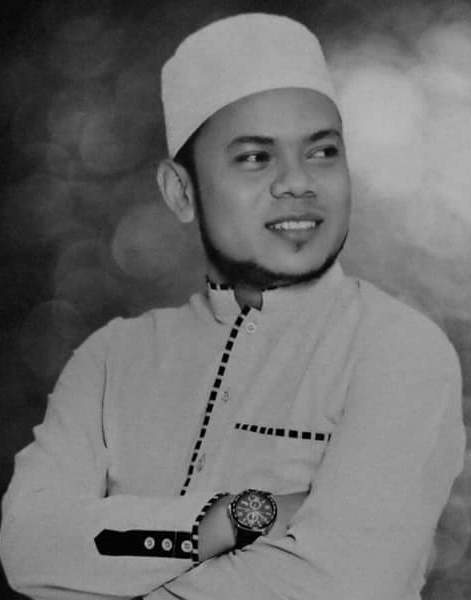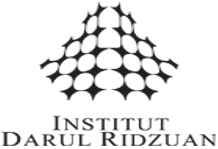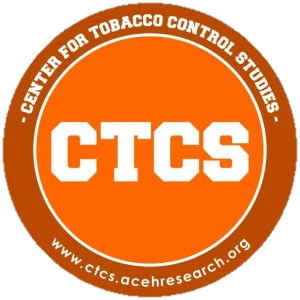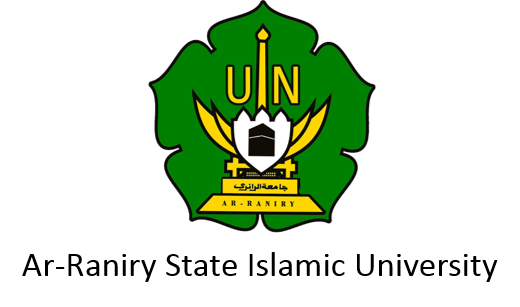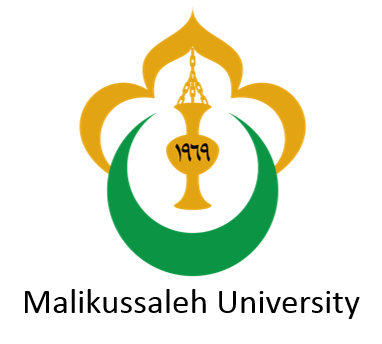[Reported by: Ariane Boulanger | 4 September 2015]
Public Discussion by Kate Manner on Female Religious Education Teachers in Formal and non-Formal Educational Settings
How does being a religious education teacher affect the agency of women in Aceh ?
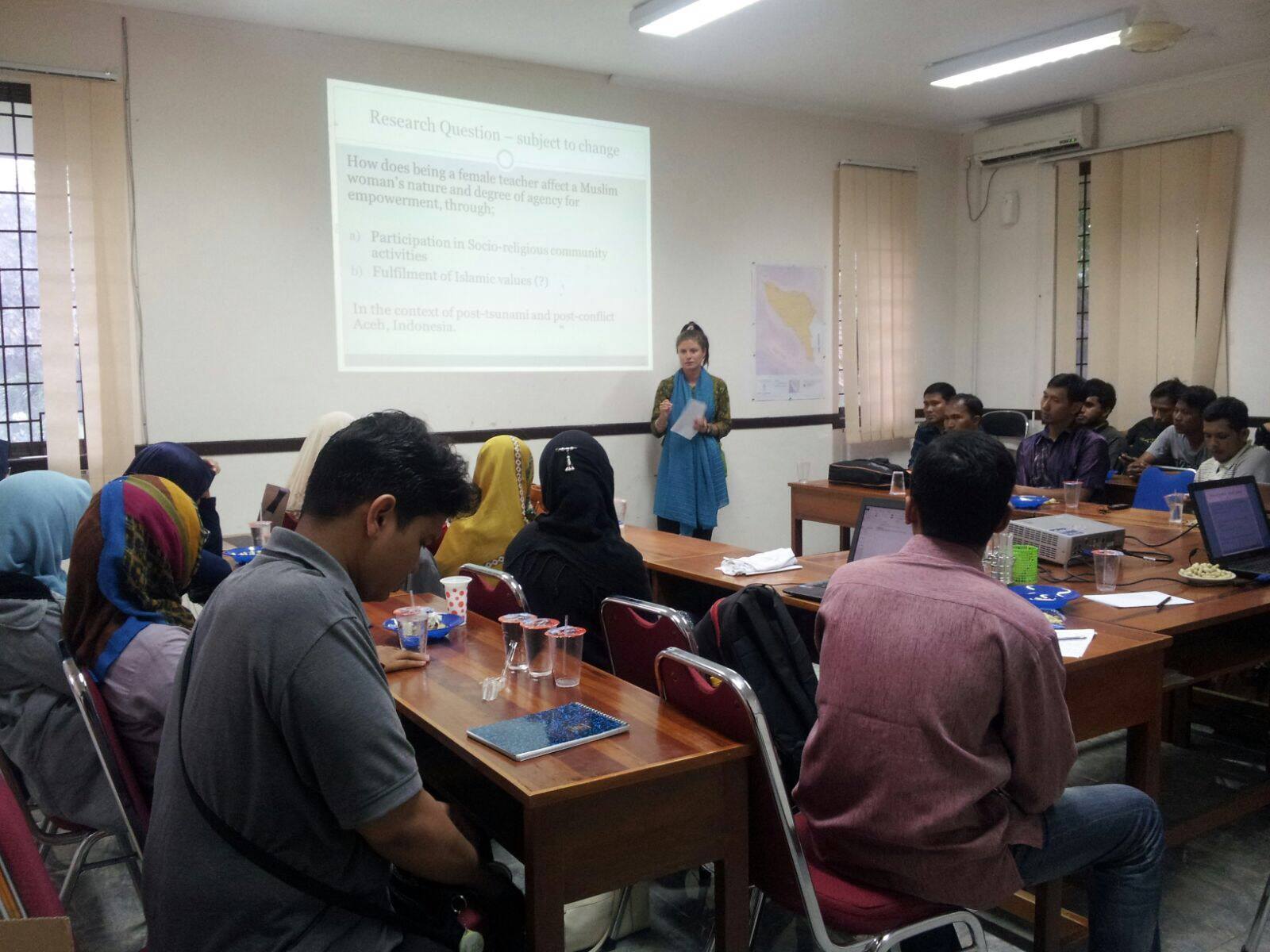 Unit of analysis
Unit of analysisThe unit of analysis were:
- Dayah Darul Ishan: 3 female religious education teachers, 2 male one and the 2 principales
- Pesantren Al-Fayah Abu Lam-U : 7 female religious education teacher and one principal
- 5 Pusat Study Wanita (UIN) activist
- 8 other female religious education teachers
Theoretical background
Kate based her research on three main theories:
- The Structural Relational Approach. It describes structure and agents (in that case teachers and schools) and how they interact, the result of this interactions, and what they produced. She focused on the interaction of women religious education teachers, which affect the schools, which affect them in return. In her interviews she looked at how they can change the structure. (see Hay 2002 and Jess 2005)
- Teacher agency theory by Vongalis Macrow. This theory adds to the previous one three key words for teachers: autonomy (or freedom to act), obligation (because teaching is an ethical activity that comes with strong responsibilities) and authority. She looked for sign of those three in the interviews. Plus, when those women leave the school, they leave their situation of relative power to come back to society.
- Muslim women’s agency: article by Mahmood about how the understanding of agency of women is strongly different in the “west” and in islam. ‘We have to think of agency NOT in terms of resistance but as the capacity for action that historically specific relations of subordination enable and create’. Notion of docility that is pejorative for the “west” but is seen as a quality in Islam –example of a pianist that needs to practice a lot sometimes painfully to get to the best level: it is more about malleability than passivity. Understanding this was a must do in her research because this is so different from her background.
Main findings
Research question: How does being a female teacher affect a Muslim woman’s nature and degree of agency for empowerment, through; Participation in Socio-religious community activities & Fulfilment of Islamic values (?) In the context of post-tsunami and post-conflict Aceh, Indonesia.
- To what extent did post-tsunami context influence female teacher’s ability for strategies with regards to socio-religious activities?
- How does the family structure influence female teacher actions?
- Does being a teacher provide opportunities that otherwise would not be available?
- How is teaching religion different, and how does this affect agency?
Five main points are striking after finishing data collection
The importance of Islam. As a foreigner, you know Islam is very important but you don’t really get it until you come and live here. Kate arrived during 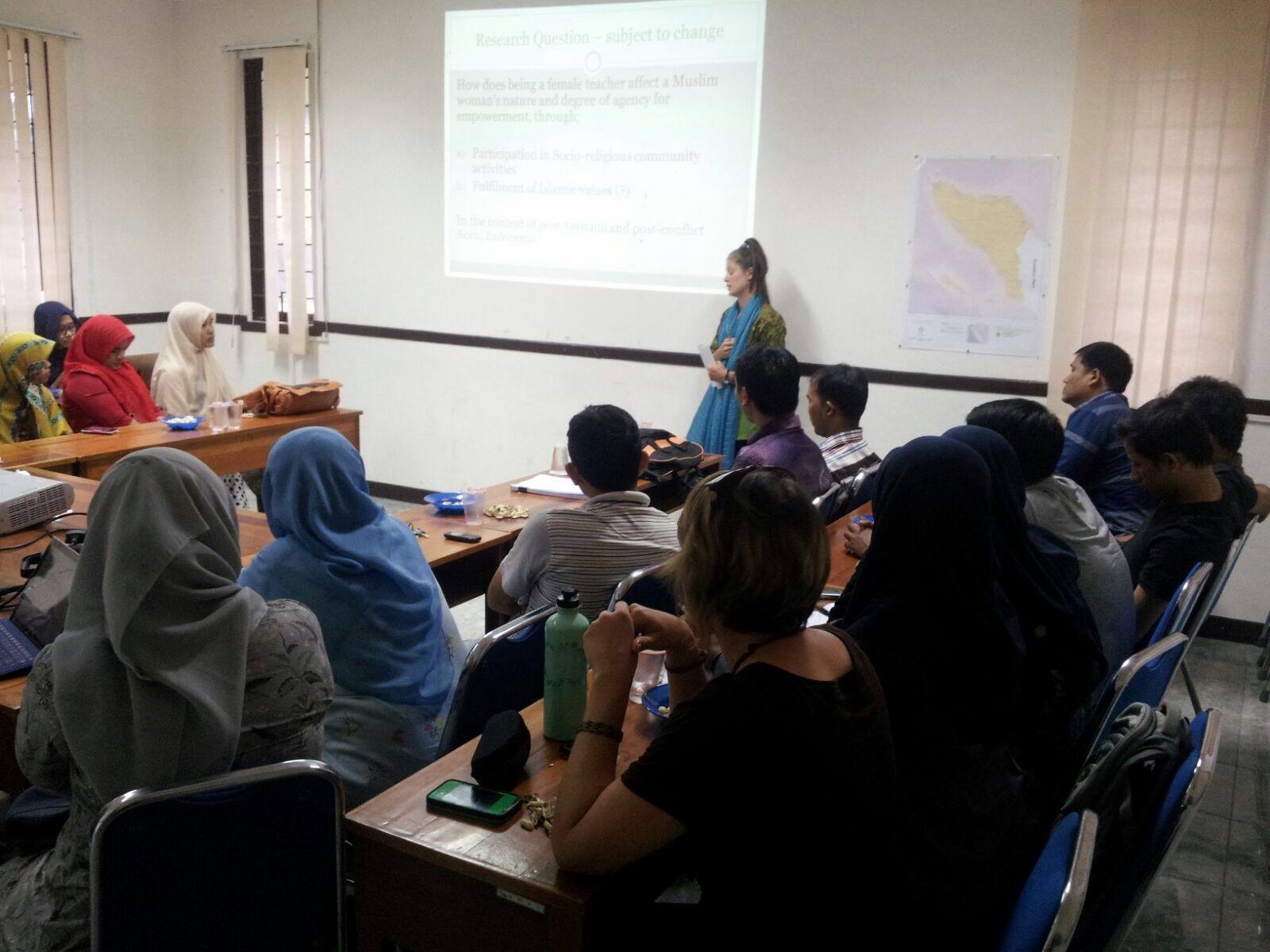 Ramadan and was struck by how intense it is. Every interviewee said that Islam is everything, nothing can be done without it. Therefore teaching religious education is crucial because this knowledge is so important.
Ramadan and was struck by how intense it is. Every interviewee said that Islam is everything, nothing can be done without it. Therefore teaching religious education is crucial because this knowledge is so important.
Parallelism between being a mother and a teacher by all women respondent
- Similar to motherhood because as you raise your children you raise the children of the nation. As a Muslim woman, raising children is so important because you are the “first madrasah”. Your home must be in good order first.
- Practical because you only work half a day so you have plenty of time to take care of your own family
Islam really emphasizes the importance of passing on knowledge and not keeping it to oneself
Religious education teachers have a greater role than a math teacher because Islam comes first, is at the foundation. If the foundations are not good, how do you want to build something if the foundations are not good? Plus, they have to match their behaviour to what they teach, as they are models to their students.
Teachers have the role of developing the nation. An educated youth is necessary to develop Aceh, and this wouldn’t be possible without women who are the first madrassah and teachers. Highly educated women are very important.
Limitations
Not speaking the language was a major hindrance, as you lose some of the information when you use a translator. Plus you need to find the translator that fits your needs the best way and that helps you gather as much information as possible. In addition, there was Islamic terms that were foreign concepts to her.
Being a white non muslim westerner was also a problem in some places, people were wary about having her and some just didn’t want her there. Some people were quite caged or had assumptions on Kate’s own assumption about Islam.
Being a female on the other hand made it much easier as she was less perceived as a threat.
She would have liked to get interviews with ministry officials from the Minister of Religion and the Minister of Education but didn’t get the chance.
Questions
Why did she choose those schools? They chose her rather than the other way around: she had good contacts in both of them (a friend, and someone close to ICAIOS) and both were willing to have her.
What will be the conclusion of her research? She just finished data collection so she didn’t had time to analyse yet. But probably that being a woman religious education teacher is empowering in a non-western way. It enable them to fulfil their Islamic values. The women from PSW used the word empowerment but the other never did. However, it is a form of empowerment as they have been able to get deep knowledge and to share it. In a western perspective it is hard to get.
Did different schools had different teaching strategies? No major difference in her opinion. However, dayah’s respondent were more oriented towards theology, whereas pesantren’s one although more conservative were more oriented toward developing Aceh.
What is the evolution of the condition of women (before/during/after tsunami)? There was a high point after the tsunami because of all the foreign NGO’s according to PSW women, that is now decreasing. Opportunities for women got a bit backward.
Why did they choose to become teachers? Most of them to pass on Islamic values.
Can she expand on empowerment here and in the “west”? Women empowerment in the west is being successful, having a great job, being a “man”. It is so different from from what it means here. Islam should not be seen as a fence but as the parameters to understand empowerment. It is a more communal vision.
 Unit of analysis
Unit of analysis Ramadan and was struck by how intense it is. Every interviewee said that Islam is everything, nothing can be done without it. Therefore teaching religious education is crucial because this knowledge is so important.
Ramadan and was struck by how intense it is. Every interviewee said that Islam is everything, nothing can be done without it. Therefore teaching religious education is crucial because this knowledge is so important. 

